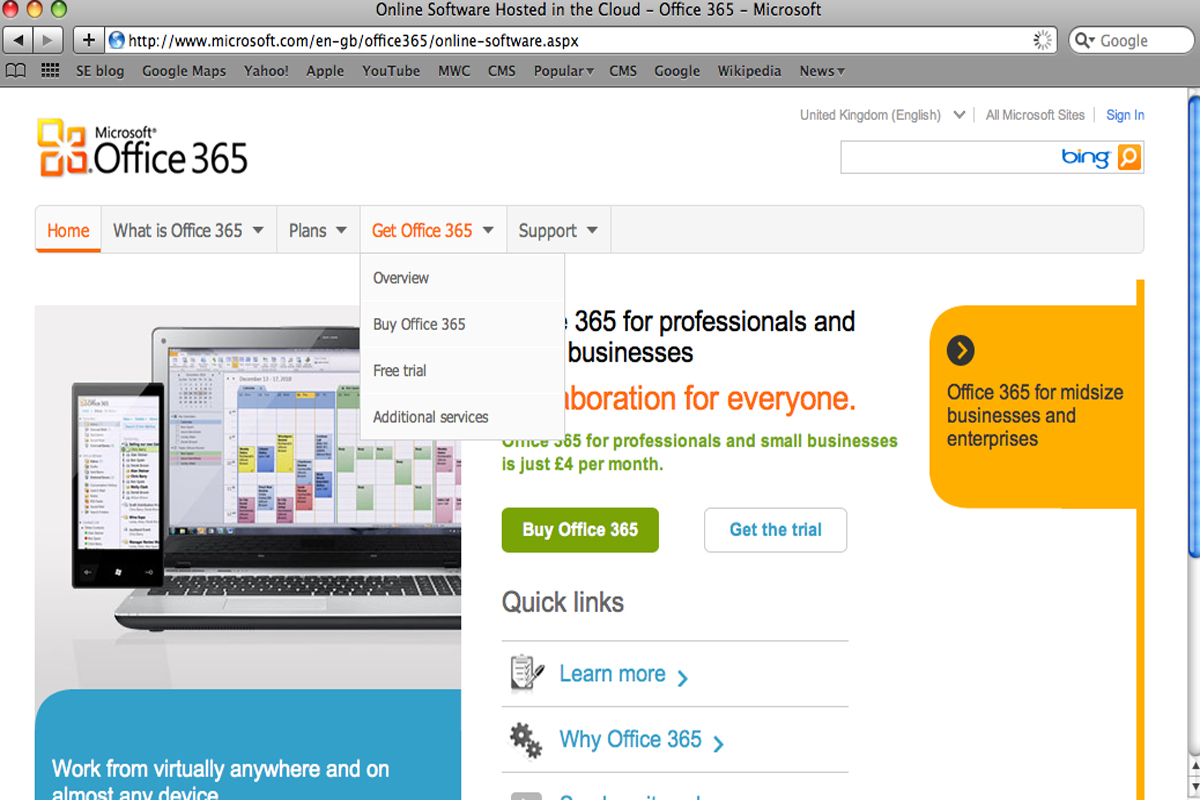
Microsoft's chief executive Steve Ballmer will hog the spotlight later today to officially welcome his company's latest product, Office 365, to the software family.
The company claims the cloud computing-focused offering brings together more than two decades of productivity tools experience. By offering Office in an online format, customers will be able to use them on a variety of devices from wherever they can get an web connection.
"Office 365 is the best of everything we know about productivity, all in a single cloud service," Kurt DelBene, president Microsoft's Office division, said in October last year when the new offering was announced.
"With Office 365, your local bakery can get enterprise-calibre software and services for the first time, while a multinational pharmaceutical company can reduce costs and more easily stay current with the latest innovations."
In launching the product, as well as satisfying customers' demands, Microsoft is also firing a shot at Google, which has stolen a small but worrying percentage of its corporate customers with cheaper, web-only alternatives.
"It's obvious that Microsoft has to do this if they're going to remain competitive with Google," said Michael Yoshikami, chief executive of money manager YCMNET Advisors. "It's something they have to do."
"If they execute effectively and it's adopted, it could be a game changer," said Yoshikami. "Whether or not that will happen is a whole other story."
Sign up today and you will receive a free copy of our Future Focus 2025 report - the leading guidance on AI, cybersecurity and other IT challenges as per 700+ senior executives
Microsoft has offered online versions of some Office programs - chiefly Outlook email - for its corporate customers for several years, and last year rolled out free versions for individual home users.
The market for web-based software services is heating up, and every company, government department and local authority is getting pitches from Microsoft and Google whenever they reevaluate their office software.
It's a new challenge for Microsoft, which built itself up on expensive versions of software installed on individual computers. That business model turned the Office unit into Microsoft's most profitable, earning more than $3 billion alone last quarter.
Microsoft's plan is to make up for smaller profit margins from web-based applications - due to the cost of handling data and keeping up servers - by grabbing a larger slice of companies' overall technology spending.
Last October, when it rolled out a test version of the new service, Microsoft said it planned to charge from $2 per user per month for basic email services to $27 per user per month for advanced offerings. Google charges a flat fee of $50 per user per year for its web-based Google Apps product, which offers email, calendars, word processing and more online.
Microsoft, like Google, will host users' data remotely, and maintain all the servers in vast datacentres. Unlike Google, it will also allow companies to put their data on dedicated servers if they choose, or keep the data on their own premises.
Earlier this month, Google snagged InterContinental Hotels Group as a major customer, moving 25,000 of its employees onto Google email from Outlook.
Google, which has had the most success in the small and medium-sized business range, says there are now 40 million users of online Google Apps suite. Microsoft does not publish equivalent numbers, but research firm comScore has estimated 750 million people worldwide use Office in some form.
But web-centric Google - whose success is based on its dominance in search - is confident it has the upper hand in the cloud.
"Compared to what they (Microsoft) have in the market today, they have nowhere to go but up," said Dave Girouard, head of Google's worldwide enterprise business. "We feel we're years ahead of them in terms of building a viable cloud solution that just works."
Read our first look review of Office 365 here. A full review will be posted soon.
ITPro is a global business technology website providing the latest news, analysis, and business insight for IT decision-makers. Whether it's cyber security, cloud computing, IT infrastructure, or business strategy, we aim to equip leaders with the data they need to make informed IT investments.
For regular updates delivered to your inbox and social feeds, be sure to sign up to our daily newsletter and follow on us LinkedIn and Twitter.
-
 Virtus Data Centres eyes further expansion under new CEO
Virtus Data Centres eyes further expansion under new CEONews Eaton will leverage his deep industry expertise to help the data center operator build on its decade-long growth
-
 What's in store for software development in 2026?
What's in store for software development in 2026?Analysis AI adoption is expected to continue transforming software development processes, but there are big challenges ahead

